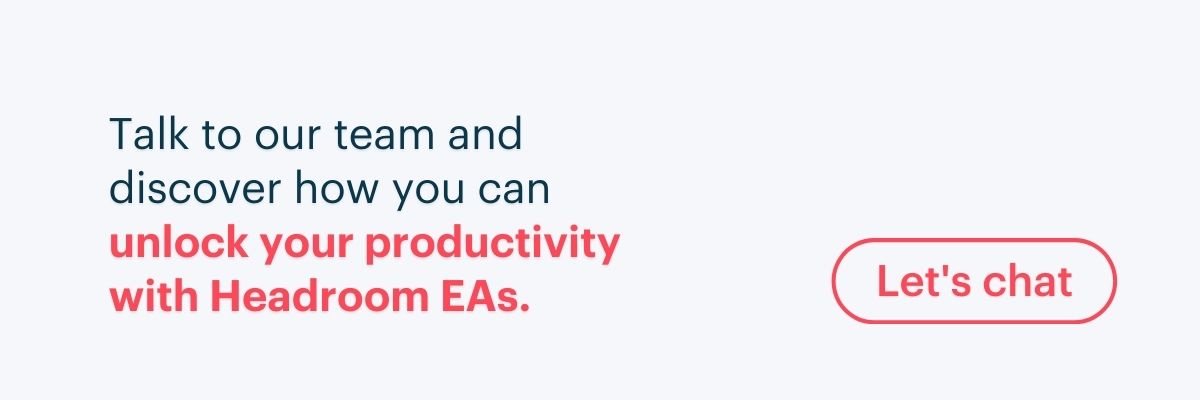Smart Work over Hard Work: Revolutionizing the workplace through coaching

In a recent episode of the Talent & Growth Podcast with Animo Group, Carmen and Sonja from Headroom shared valuable insights into our successful internal coaching program, and why we live by the saying “Work Smarter, not Harder”.
In this exciting discussion, Sonja (Head of People) and Carmen (EA Coach) walk you through how we implemented internal coaching at Headroom and how we saw an increase in Employee Happiness and retention. They also give advice for organizations like yours looking to establish their own employee coaching programs.
Let’s explore the transformative impact of internal coaching and how it can lead to long-term team success!
The State of Employee Coaching in 2023
Internal coaching programs are becoming increasingly popular in the corporate world, and not just foe C-level leaders.
Coaching offers a unique opportunity for companies to nurture talent from within, boost employee satisfaction, and enhance overall performance. Carmen and Sonja from Headroom, a remote Executive Assistance service company, have first-hand experience in developing and implementing an internal coaching program that has yielded remarkable results in their Executive Assistant team.
The Coach profile: How to build a culture of coaching excellence
Choosing the Right Candidates: Selecting the right individuals for coaching roles can be a daunting task. As Sonja explains, “It’s crucial to find those with the right skills and interests. Not everyone is cut out to be a coach. We want people who genuinely care about our team’s growth.”
Maintaining Confidentiality: Internal coaches often deal with sensitive information. Carmen highlights the importance of trust and integrity in coaching, saying, “Dealing with confidential data is a significant responsibility. Coaches must have the organization’s best interests at heart. Without trust, this program wouldn’t work.”
Calibration and Assessment: Keeping coaching assessments consistent is vital. Sonja emphasizes the value of calibration sessions, stating, “We conduct regular calibration meetings to ensure fairness and objectivity. Different perspectives may arise, but it’s essential to align our assessments and maintain consistency.”
Measuring Success: Measuring the success of an internal coaching program is not always straightforward. Carmen explains, “We use various methods to gauge progress. One-on-one sessions with the coached individuals, quality frameworks, and assessments help us track development. It’s crucial to provide constructive feedback for improvement.”
The transformational impact of Executive Assistant coaching
The impact of Headroom’s coaching program is evident. It has not only weathered challenging times but also contributed to the company’s steady growth. Carmen reflects, “During the COVID-19 pandemic, we managed to maintain a satisfied team. Coaches played a pivotal role in supporting our employees stuck at home, ensuring they remained content and productive.”
Sonja adds that Headroom’s program has helped retain valuable talent. It’s created a bridge between our executive assistant team and management, fostering a strong sense of unity and purpose.
The #1 Advice for establishing a coaching program: Build internal support first
Carmen and Sonja offer valuable advice for organizations considering their own coaching programs:
- Identify the Problem or Need: Before diving into coaching, pinpoint the specific problem or need you want to address within your organization. Carmen advises, “Start by asking yourself what challenge you’re trying to solve.”
- Allocate Resources Wisely: Developing an effective coaching program requires time and resources. Be prepared to invest both. Sonja emphasizes, “Understand the time and financial commitment involved in creating a successful program.”
- Build Internal Support early on: you need to align and get buy-in from different departments first. Sonja highlights the importance of garnering support, saying, “Ensure that your initiative has the backing of the entire organization. This alignment will be your foundation.”
A look at real stories of Coaching success
To show the real impact of an internal coaching program, Carmen shares a compelling story: “One of our EAs was struggling with a challenging project. Through coaching, she developed the skills and confidence needed to excel. Today, she’s a valuable asset to our team and a testament to the power of our program.”
Sonja adds, “We had three senior EAs who chose to stay with us because of the coaching opportunity. It really shows the value of internal coaching in retaining top talent in such a volatile industry like the admin support one.”
In conclusion: Internal coaching transforms organizations, increase retention and boost performance
Internal coaching programs have the potential to transform your organization, foster talent, and boost performance. The insights shared by Carmen and Sonja underscore the importance of careful planning and investment in such programs (and the way they speak about Headroom makes us blush!).
By following their advice and recognizing the transformative potential of coaching, your company can really nurture a culture of excellence and continuous learning that will benefit your team and your bottom-line!
Curious to learn more about how we do internal coaching to skyrocket our Executive Assistants’ success? Contact us!
.
